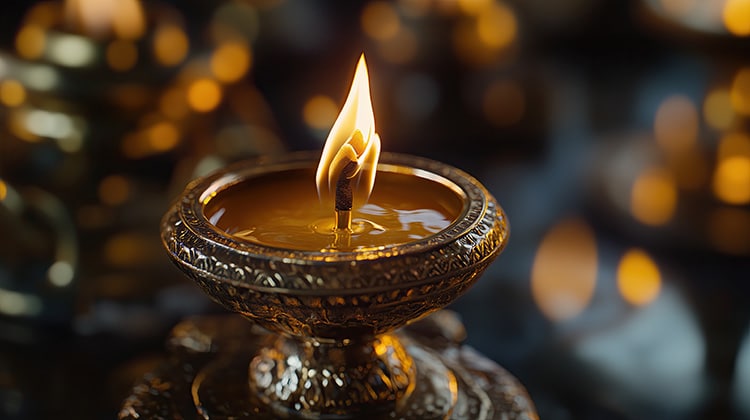Calming Nighttime Anxiety for Better Sleep
Category: Benefits of Meditation | Health and Meditation | Stress and Anxiety

What is Sleep Anxiety? (How to Calm Anxiety at Night)
If your anxiety gets worse at night, preventing you from sleeping well, you’re not alone. More than half of adults in the US say their anxiety keeps them awake at night. And when anxiety makes falling asleep or staying asleep difficult, that lost sleep leads to greater anxiety! Learn how to calm anxiety at night, and why meditation for anxiety may be the best solution.
Anxiety is a pervasive feeling of worry, nervousness, fear or unease and is typically related to a future or imagined event with an uncertain outcome. Acute anxiety is normal, but anxiety can become a disorder when it’s persistent, or interferes with daily (or nightly) life. Anxiety and sleep are bi-directionally related. Lack of sleep affects areas of the brain that make anxiety worse, while anxiety releases adrenaline and stress hormones that prevent us from sleeping. Each influences the other.
Nighttime anxiety isn’t necessarily different from anxiety at any other time of the day. But as daytime distractions wane and we find ourselves alone in the quiet evening hours, we may notice our anxiety more. Symptoms include the following:
- Tossing, turning and a general feeling of restlessness
- Rumination and intrusive thoughts you just can’t let go of
- Overwhelming worry that your inability to sleep will affect you the next day
There are two main approaches to calming anxiety at night. One is to treat the symptoms, and the other is to treat the cause. These two approaches work best when they are practiced together.
Sleep Hygiene: Treating the Symptoms
Sleep hygiene practices are the healthy habits that treat the symptoms of sleep anxiety. While these nighttime routines won’t cut to the root of your worry, they can improve your chances of falling asleep sooner, and staying asleep through the night. Good sleep hygiene habits include the following:
- Follow a circadian rhythm as closely as possible. Go to bed when it’s dark outside and wake up when it’s light out. Better yet, go to sleep and wake up at the same time each day. In the 1-2 hours before bed, avoid bright lights, especially the blue light of screens. And if you wake up in the middle of the night, stay in the dark. Use blackout curtains if needed.
- Embrace an evening wind-down routine. Exercise regularly, but in the morning. Avoid caffeine after noon. And in the 2 hours before bedtime, avoid heavy foods or alcohol. As evening approaches, refrain from stress-inducing activities such as checking your email. Instead, begin a journaling routine, or take a warm bath or shower.
- Practice relaxation techniques. As you lie in bed at night, relaxation techniques can help you fall asleep sooner. Try deep breathing through the nose, counting breaths, or grounding by sensing your body and bed. In progressive muscle relaxation with a body scan meditation technique, you systematically squeeze then release each part of your body from your toes to your face. If you wake up at night, return to these same techniques versus getting out of bed.
You can think of sleep hygiene as scaffolding for the mind – it lends you structure while you work on inner stability through the practice of meditation.
Meditation for Sleep Anxiety: Treating the Cause
When we address the root cause of our anxiety, sleep improves. In fact, studies show that while sleep hygiene practices are helpful, those who meditate regularly see a greater improvement in their nighttime sleep. Meditation for better sleep doesn’t have to take place in bed at night. In fact, since meditation requires you to stay awake and alert, it may be better practiced in the morning or during the day. Meditation makes it easier for us to remain present when we’re alone with our thoughts and emotions. As mindfulness, awareness and self-compassion increase, rumination decreases.
When practicing meditation for anxiety, it can seem as if your anxiety gets worse once the body and mind gets quiet. This is the same thing that happens as we lay down to sleep. But daytime meditation gives us the opportunity to pause and kindly explore our anxiety, without the added pressure of needing to fall asleep. By watching and witnessing our anxiety, as if from a distance, we begin to discern between our sense of self, and our experience of anxiety. We also notice that our anxiety changes. Anxiousness begins to feel less permanent and solid. With time, our relationship to worry is transformed, and further improved as we get more sleep.
Meditation and sleep have a bi-directional relationship, too. Better sleep, plus daily meditation, changes the brain. With improved sleep, the centers of stress that lead to anxiety become less active, making it less likely you’ll experience sleep anxiety in the future.






